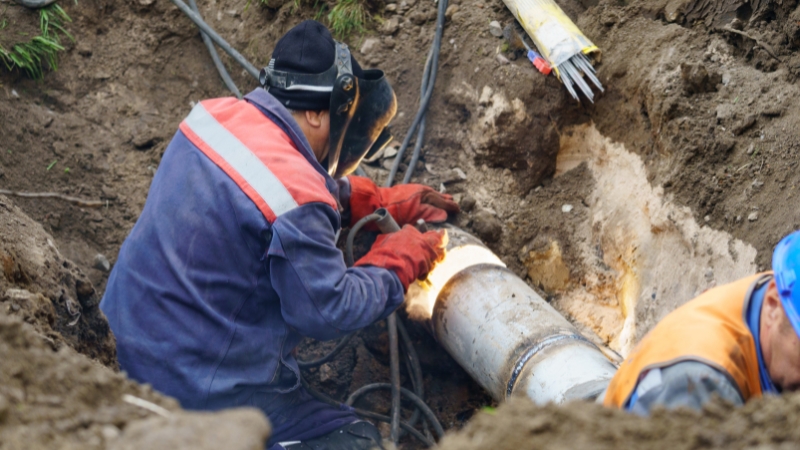Water leaks can be a silent threat to your home. They often go unnoticed, quietly causing damage to your property and increasing your utility bills. While some water leaks are easy to spot, many remain hidden for long periods, leading to costly repairs down the line. Detecting these leaks early can save homeowners from the headaches of water damage and expensive utility bills. In this comprehensive guide, we’ll explore the 7 hidden signs of water line leaks that you might be ignoring and why it’s essential to take immediate action.
Table of Contents
Toggle1. Unexplained Increase in Water Bills
One of the most common hidden signs of a water line leak is an unexpected spike in your water bill. If your water usage has remained consistent, yet your bill is steadily increasing, this could be an indication of a hidden leak.
How It Happens: Small leaks can add up quickly. A drip from a leaky faucet or pipe can waste gallons of water daily, inflating your water bill over time. Most homeowners overlook this sign, attributing the increase to seasonal fluctuations or personal consumption. However, it’s crucial to monitor your water bills regularly and compare them month-to-month. A sudden and unexplained increase is often one of the first signs that something is wrong with your plumbing system.
Why It Matters: Ignoring a high water bill doesn’t just waste money—it can also lead to significant structural damage to your home. Leaking water can seep into walls, floors, and foundations, causing rot, mold, and weakening your home’s structural integrity.
2. Damp or Discolored Spots on Walls, Floors, or Ceilings
Another hidden sign of a water line leak is the appearance of damp or discolored spots in unusual places. These spots often indicate that water is escaping from your pipes and soaking into your home’s structure.
How It Happens: When a pipe leaks behind a wall or under the floor, the water gradually saturates the surrounding materials. Over time, this water creates visible signs like damp patches or discoloration. In some cases, you might also notice the formation of bubbles in paint or wallpaper.
Why It Matters: Moisture trapped in walls and floors can lead to mold growth, which poses serious health risks to you and your family. Additionally, prolonged exposure to water can cause structural components like wood and drywall to rot, leading to costly repairs. If you notice damp spots or discoloration, it’s crucial to act quickly to prevent further damage.
3. Low Water Pressure Throughout Your Home
While low water pressure is often associated with clogs or problems with your water provider, it can also be a sign of a hidden leak in your plumbing system.
How It Happens: When there’s a leak in your water line, some of the water meant to flow through your pipes is escaping into the surrounding areas. This reduces the overall water pressure throughout your home. The change may be subtle at first, but if you notice that your showers, faucets, or other water outlets are producing less pressure than usual, it could indicate a leak somewhere in your system.
Why It Matters: Low water pressure can be frustrating, but the underlying issue is often more serious. A water leak can worsen over time, leading to even more significant drops in pressure and increasing your risk of water damage.
4. Sound of Running Water When No Taps Are On
Have you ever heard the sound of running water when all your faucets are off? This mysterious noise is often a clear indication of a hidden water leak.
How It Happens: When a pipe is leaking, the water continues to flow through it even when you’re not using any fixtures. This creates a distinct sound, often resembling the hum or trickle of running water. The noise might be subtle, or you might only hear it when your house is quiet, such as at night.
Why It Matters: If you hear water running and no taps are on, it’s important to investigate immediately. A water leak that is allowed to continue can cause extensive damage to your home’s foundation, walls, and ceilings, and it will also waste a significant amount of water.
5. Warm or Wet Spots on the Floor
One of the more subtle signs of a water leak is the presence of warm or wet spots on your floor, especially if they appear in areas where there’s no plumbing fixture nearby.
How It Happens: Leaks from hot water lines can cause localized warm spots on your flooring. If your home has a concrete slab foundation, the water may be leaking under the slab, slowly heating the surface above it. This is a common issue in homes with radiant floor heating systems or in areas where water pipes run underneath flooring.
Why It Matters: Warm or wet spots on your floor can signal significant problems, particularly if the leak is coming from a hot water line or from pipes embedded in your foundation. Left unchecked, this can lead to foundation cracking, mold growth, and other serious structural issues.
6. Mold or Mildew Smell in Your Home
Even if you don’t see visible signs of a water leak, you might smell it. A musty or moldy odor in your home is often a telltale sign of hidden moisture, which could be caused by a water leak.
How It Happens: Water leaks create the perfect environment for mold and mildew to thrive. When water seeps into walls, floors, or ceilings, it can remain undetected for long periods, allowing mold to grow. As the mold multiplies, it releases a distinctive odor that can be quite strong.
Why It Matters: Mold doesn’t just smell bad—it can be a serious health hazard. Exposure to mold spores can cause respiratory problems, allergic reactions, and other health issues, especially for people with asthma or allergies. If you notice a persistent moldy smell in your home, it’s essential to have a professional inspect your property for water leaks and mold growth.
7. Cracks in Your Foundation or Walls
Cracks in your home’s foundation or walls can be a sign of long-term water damage caused by a hidden leak.
How It Happens: Water leaking from pipes can seep into the ground around your home’s foundation, causing the soil to shift. This shifting can create pressure on your foundation, leading to cracks. Similarly, water leaking behind walls can cause the materials to weaken and crack over time.
Why It Matters: Foundation damage is one of the most expensive problems a homeowner can face. If left unchecked, even small cracks can widen, leading to structural instability. In extreme cases, foundation damage can make your home unsafe to live in. If you notice any new cracks in your foundation or walls, it’s essential to have them inspected immediately.
What to Do If You Suspect a Water Leak
If you notice any of the signs mentioned above, it’s crucial to act quickly to prevent further damage to your home. Here’s what you should do if you suspect a water leak:
- Turn off the water: If possible, locate your home’s main water valve and turn it off to prevent any more water from leaking into your home.
- Check your water meter: After turning off the water, check your water meter. If it’s still moving, you likely have a leak.
- Call a professional: Water leaks can be difficult to detect and repair without the proper tools and expertise. Contact a professional plumber to inspect your home, locate the leak, and recommend the best course of action.
- Repair any damage: Once the leak is fixed, it’s essential to address any water damage as soon as possible. This may involve replacing damaged drywall, flooring, or insulation, as well as treating any mold growth.
Preventing Future Water Leaks
Preventing water leaks before they happen is always the best course of action. Here are some tips to help you avoid leaks in the future:
- Inspect your plumbing regularly: Keep an eye on your pipes, faucets, and water appliances for signs of wear and tear. Address any issues promptly to prevent leaks.
- Install water leak detectors: These devices can detect leaks early and alert you before the damage becomes significant.
- Replace old pipes: If your home has old or corroded pipes, consider having them replaced with newer, more durable materials.
- Maintain proper water pressure: High water pressure can put a strain on your pipes, increasing the likelihood of leaks. Use a pressure regulator to keep your water pressure within a safe range.
Conclusion
Water leaks may seem like a minor inconvenience, but they can cause significant damage to your home if left unchecked. By staying vigilant and watching for the 7 hidden signs outlined in this article, you can detect leaks early and prevent costly repairs. Remember, if you suspect a leak, it’s always best to call a professional plumber to diagnose and fix the issue before it worsens.
Experience the Ultimate Solution for Water Line Leak Detection with Garcia Home Restoration!
At Garcia Home Restoration, we know the frustration and potential damage that hidden water line leaks can cause. Our expert team specializes in water line leak detection, ensuring that even the smallest leaks are quickly identified and resolved before they lead to more serious problems.
Our mission at Garcia Home Restoration goes beyond simply fixing leaks; we focus on improving the overall efficiency of your plumbing system, helping you avoid costly repairs and excessive water bills. With a solid reputation across Contra Costa County, we are trusted for our expertise, attention to detail, and commitment to delivering exceptional plumbing services. Don’t let an undetected water line leak cause unnecessary damage or expenses. Contact us today for top-quality water line leak detection services and enjoy the peace of mind that comes with a properly maintained plumbing system!




